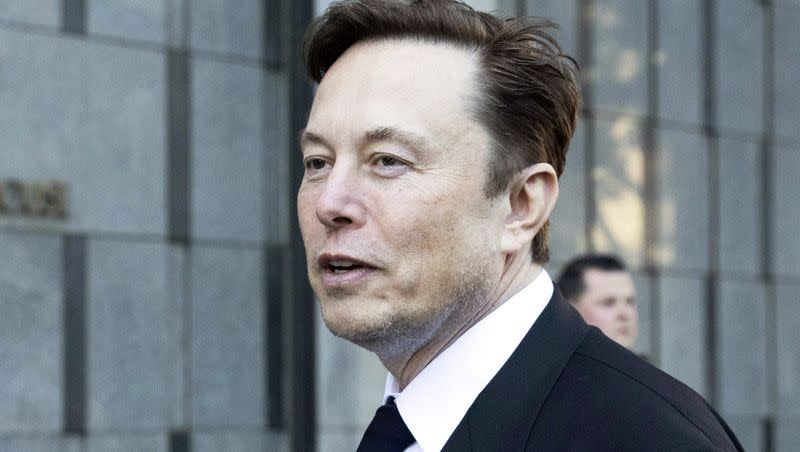Twitter tantrum? Elon Musk defends labeling NPR ‘state media’ outlet, targets NYT, embraces fecal response to news inquiries

- Oops!Something went wrong.Please try again later.
Twitter owner and self-described Chief Twit Elon Musk continues to foment both fun and fury among his fans and foes with an ongoing ad hoc management style that is driving plenty of commentary albeit, even as the social media platform he acquired last October for $44 billion continues to lose billions of dollars in value.
Here are a few of the more recent moves Musk has overseen in the Twitter-verse:
On Tuesday, Twitter added a “state-affiliated media” tag to National Public Radio’s main Twitter account. The designation, according to Twitter policy documents, is one reserved for “outlets where the state exercises control over editorial content through financial resources, direct or indirect political pressures, and/or control over production and distribution.” As of Tuesday, according to The Associated Press, Twitter’s policy page also included language specifically exempting NPR from this label: “State-financed media organizations with editorial independence, like the BBC in the UK or NPR in the US for example, are not defined as state-affiliated media for the purposes of this policy.” But, the passage has since disappeared from Twitter’s policy postings.
In its own reporting on the matter, NPR said it operates independently of the U.S. government and notes that while federal money is important to the overall public media system, NPR gets less than 1% of its annual budget, on average, from federal sources.
NPR CEO John Lansing said that millions of listeners support and rely upon NPR for “independent, fact-based journalism.”
“NPR stands for freedom of speech and holding the powerful accountable,” Lansing said. “It is unacceptable for Twitter to label us this way. A vigorous, vibrant free press is essential to the health of our democracy.”
In a reply to NPR on Twitter, Musk quoted from the current policy language and added his own note about the labeling decision, “Seems accurate.”
Seems accurate pic.twitter.com/nx5TmJY7GX
— Elon Musk (@elonmusk) April 5, 2023
Ever since taking over Twitter, Musk has mused about the blue account verification check mark that, previous to the ownership change, could be earned free of charge. After months of speculation, and an initial failed attempt to move the blue check to a pay-to-play model, Twitter announced last month that legacy blue check marks would start to disappear on April 1. After that date, a new tiered system allows individuals to gain a blue check label for their account via a $7 per month subscription or, for organizations, a gold verification check mark for $1,000 per month.
While many legacy blue check marks are still appearing on the platform, shortly after announcing it would not pay a fee for any Twitter verification mark, The New York Times, which has almost 55 million followers on the platform, had its account verification check removed. On Sunday, Musk lampooned the paper in a series of tweets, calling its content “propaganda” and characterizing the publication’s Twitter feed as “the equivalent of diarrhea.”
The real tragedy of @NYTimes is that their propaganda isn’t even interesting
— Elon Musk (@elonmusk) April 2, 2023
Shortly after Musk took over Twitter last year, the platform’s communications with media via its press account went essentially silent, with many believing that the cutoff was the result of mass layoffs at the company.
But the press@twitter.com account became active again last month, after Musk announced that all inquiries received there would get an identical, automated response — a poop emoji. A test email sent by this report confirmed that the policy was still in place on Thursday.
press@twitter.com now auto responds with 💩
— Elon Musk (@elonmusk) March 19, 2023
On Monday, users noted Twitter’s blue bird logo on the platform’s website and landing pages had been changed to a cartoon thumbnail of a shiba inu, an image associated with the cryptocurrency memecoin Dogecoin. Musk has been a vocal fan of Dogecoin, stumping for the meme token on Twitter and in public appearances. He’s also a defendant in a $258 million federal class action lawsuit that alleges Musk engaged in illegal racketeering by promoting Dogecoin.
Launched in 2013 and meant to be a joke poking fun at Bitcoin and other established cryptocurrencies, the token could be purchased for 2/100 of one cent when it first became available. As of midday on Thursday, Dogecoin had a market capitalization of $12.7 billion and is the 13th most valuable cryptocurrency currently trading, according to crypto tracking website CoinGecko.
Musk has not offered any public explanation of the logo change but did offer a response in a Monday tweet to a chain of commentary on swapping out the blue bird for the “doge” image.
As promised pic.twitter.com/Jc1TnAqxAV
— Elon Musk (@elonmusk) April 3, 2023

